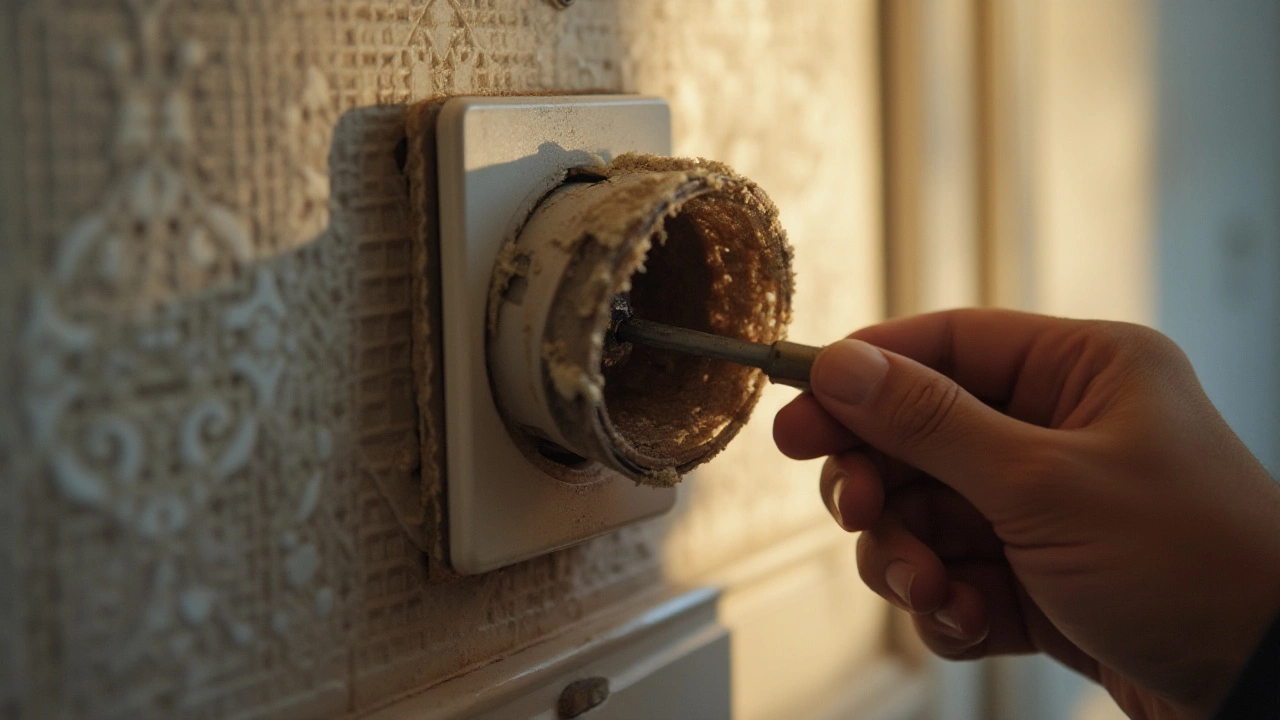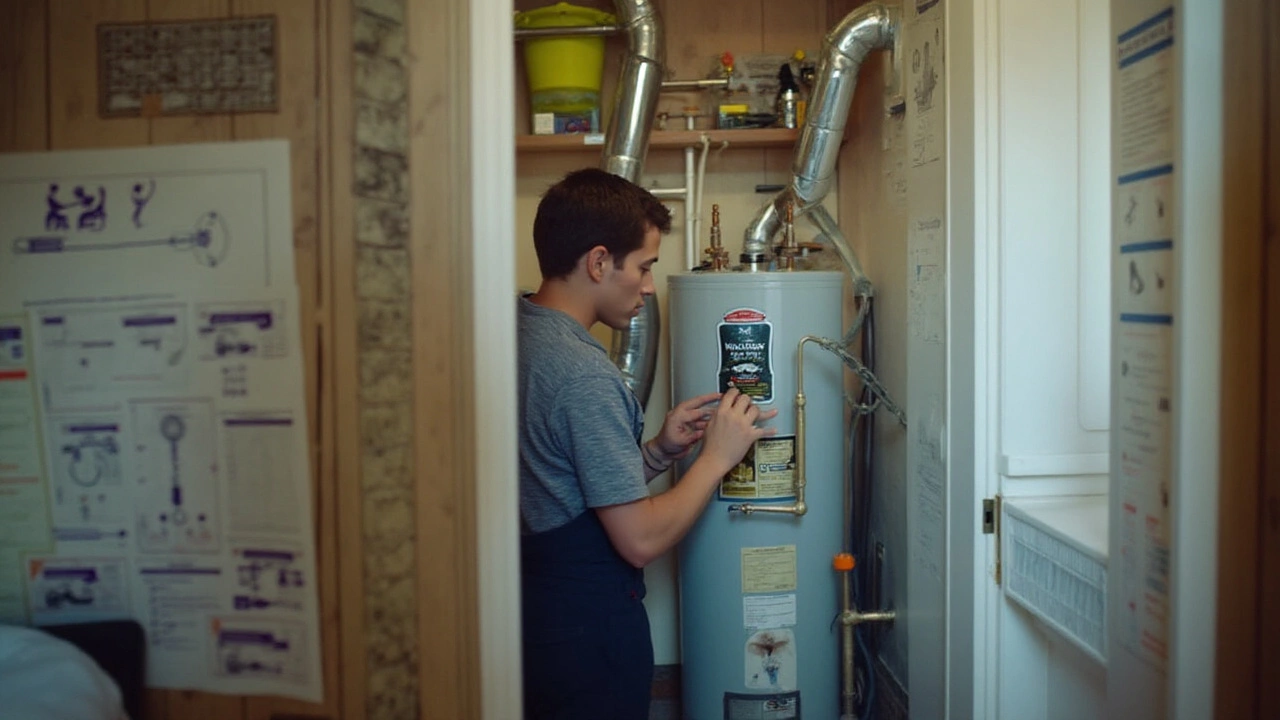Few things are as frustrating as stepping into a chilly shower on a crisp morning because your hot water heater decided to take a break. It's an experience many of us have had at least once, and it can leave you wondering what might have gone wrong overnight. Understanding the reasons behind this sudden failure is the first step towards a solution.
Your water heater, that quiet workhorse, often gets taken for granted until that shocking moment of ice-cold reality washes over you. Before you panic, though, know that many of these issues can be tackled with a bit of knowledge and elbow grease. Dive into the next sections as we unravel how these trusty devices can go off track and what you can do to fix them pronto.
- Common Causes of Sudden Failure
- Quick Troubleshooting Tips
- Maintenance Practices
- When to Call a Professional
Common Causes of Sudden Failure
It's one of those mornings when everything seems perfect until it isn't—the hot water heater conks out, leaving you contemplating the mysteries of plumbing. A sudden failure can feel daunting, but knowing the usual culprits goes a long way in deciphering the riddle. One of the chief reasons is an issue with the power supply. It might sound basic, but these heaters rely on either electricity or gas to function. A tripped circuit breaker or a blown fuse could interrupt the power flow needed for heating. Another possibility is a closed gas valve—or even a pilot light that has miraculously blown out—leaving your water stone cold.
Then, there is the thermostat, often lurking silently in the heart of your water heater. Thermostats regulate the water's temperature, and a faulty one can make life uncomfortable quickly. A malfunction might mean it isn’t sending the right signal to the heating elements or gas burner, leaving the water lukewarm at best. The wear and tear on these parts could make a difference, primarily when those elements are corroded or coated with mineral deposits. Speaking of which, sediment buildup is another frequent offender. As water is heated repeatedly, minerals like calcium and magnesium from 'hard water' can settle at the bottom of the tank. This sediment may create a barrier between the burner and the water, causing inefficiency and even system failure.
An often overlooked but critical part of the water heater mechanism is the dip tube. Think of the dip tube as a highway guiding cold water right into the tank's heart where it's supposed to get heated. If the dip tube breaks or detaches, incoming water doesn't reach the heating element properly. Instead of circulating and getting toasty, cold water mixes with hot water at the top, often resulting in the dreaded shock of icy water when least expected. Addressing the anatomy of a tank doesn't end there. Pressure relief valves, like safety nets, are crucial too. When defective, they might not release excess pressure appropriately, putting the tank at risk of damage or sudden breakage, potentially turning your cozy home into a mild disaster zone.
In the world of common causes, blame also visits leaks. A leak might start with a dingy puddle, silent and stealthy, often going unnoticed until rust or corrosion crops up. Keep an eye out for any signs of rust near the tank or dripping around fittings, as these hint toward compromised seals, requiring attention. This might seem like a laundry list of potential issues, yet understanding these factors is key to quick response and resolution. There's wisdom to these mishaps, as sources like the US Department of Energy point out by suggesting regular maintenance to alleviate damage and prolong a heater's life:
"Routine maintenance is the best prevention to ensure hot water abundance and efficiency."
Knowing what's potentially going wrong with your hot water heater not only arms you with information but gives you the confidence to fix minor snafus and seek help when necessary. Essentially, unraveling what feels like tangled wires tells the story of why and how to set it right again.

Quick Troubleshooting Tips
When your hot water heater unexpectedly stops working, it can feel like your day has come to a standstill. But before you call in the cavalry, let’s go through some straightforward troubleshooting steps. First off, simply check the power source. It sounds basic, but more often than you'd think, the solution is as easy as ensuring the appliance is plugged in or the circuit breaker isn't tripped. Electric water heaters rely heavily on a consistent power supply, and any interruption can halt their operation.
If electricity isn't the issue, we need to consider the thermostat. Imagine it as the brain of your water heater. On occasion, it may need a manual reset. Most units have a reset button you can press to hopefully get things up and running again. If the thermostat is faulty, your heater might still operate, but the water won't reach the right temperature. Now, let's shift gears and talk about gas water heaters. For these units, ensure the pilot light is lit. A gust of wind or simple oversight can snuff the flame, and it's worth checking if that's the culprit. Relighting the pilot light can often be the simplest and quickest fix.
"Maintenance on your water heater is key to ensuring it works when you need it," says plumbing expert James Bryant, "without regular checks, minor issues can morph into major problems."
Next, let's talk about sediment buildup. Over time, minerals in your water supply can settle at the bottom of the tank, creating a barrier between the water and the heating element. This is especially common in areas with hard water. It may cause your water heater to run inefficiently or even stop heating entirely. Consider draining the tank annually to prevent sediment buildup. To do this safely, turn off the power or gas supply, attach a hose to the drain valve, and let the water flow until it runs clear. This simple act can extend the life of your appliance significantly. Moving on, if you have a newer model with diagnostic capabilities, take advantage of any error codes displayed. These codes can often point you directly to the issue, saving countless hours of guesswork.
Lastly, inspect any visible components for wear and tear. This includes examining connections and valves for leaks, which can lead to a drop in efficiency or even cause the heater to fail. Regular inspections can prevent these from turning into larger, costlier problems. If after trying all of these quick fixes your hot water heater remains uncooperative, it might be time to call in a professional. Sometimes, parts need to be replaced, or the unit may be nearing the end of its life cycle. An expert can provide the assurance needed that you won't be left in the cold again.

Maintenance Practices
Taking care of your hot water heater is a bit like nurturing any relationship; a little attention and routine care can go a long way in avoiding dramatic breakdowns. A regular maintenance schedule not only extends the lifespan of your appliance but also keeps your hot showers flowing smoothly. The first step in a good maintenance routine is getting to know your heater better – familiarizing yourself with its settings, location, and any unique quirks it might have. Understanding how it responds to changes in load or water quality can clue you into anything unusual before it becomes a major problem.
One of the most critical tasks is the regular flushing of your water tank. Over time, sediment can build up inside the tank, which can cause blockages and affect heating efficiency. By draining the tank once or twice a year, you can prevent this sediment from causing any trouble. The process is relatively simple: turn off the heater, connect a hose to the drain valve, and let the water run until clear. But remember, safety first! Make sure the water has cooled down before you start the process to avoid any burns.
Another simple yet effective practice is to check the temperature setting. Keeping it around 120 degrees Fahrenheit not only saves energy but also reduces the risk of scalding while minimizing the mineral buildup. It's a small adjustment that makes a sizable impact in the long run. If you’re not sure about making these adjustments or just want a professional eye on the heater's condition, annual inspections by a plumber are worth considering. According to
experts at HomeAdvisor, “Annual maintenance checks can greatly reduce emergency repair calls and extend the lifespan of your water heater.”
Don't forget the importance of checking and replacing the anode rod, which is essential in preventing rust inside the tank. These rods attract corrosive elements, and over time, they disintegrate. This component usually needs a replacement every 3-5 years, depending on your water quality. It’s a small but mighty defender of your water heater’s health. Another overlooked hero is insulation; insulating the tank and surrounding pipes can significantly improve efficiency and reduce heat loss. A simple layer of insulated material can do wonders for performance, especially during those chilly months.
For those who like data and tangible insights, keeping an eye on energy bills can provide useful pointers. A sudden spike might indicate your water heater is working harder than necessary. A yearly increase in power consumption might signal the need for maintenance or replacement parts. Often, what seems like a daunting task can be simplified into a series of manageable actions. Always remember, by investing a bit of time into these maintenance practices, you not only ensure a steady supply of hot water but also cozy warmth knowing that your hot water heater remains in top shape.

When to Call a Professional
So, you've tinkered with the thermostat, reset the circuit breaker, and even drained the tank to clear up any sediment buildup, yet your hot water heater remains stubbornly on strike. Before resigning to weeks of cold showers or attempting any risky DIY repair that could lead to more serious problems, know when it’s best to call in an expert. It's a decision that could save both headache and cash in the long run.
Professional help is essential if you notice any leaking from the heater. Water puddling around the unit could indicate a crack in the tank, which is a situation requiring immediate attention. It’s easy to ignore a small leak, thinking it’s just a minor issue, but over time it could lead to mold growth or even structural damage to your home. Leaks are a sign of a looming breakdown, and an experienced technician can identify the exact cause and fix it before it escalates.
"Don't ignore what seem like minor leaks or noises. They might appear trivial at first, but can quickly part your pocket with enormous repair bills if left unattended," says Sarah Robbins, a licensed master plumber with over two decades of experience.
If your water heater produces rusty water, it might mean the anode rod is worn out. This rod protects the tank from corrosion, and its degradation could indicate impending tank failure. A professional can inspect and replace the rod if necessary. Also, if the unit makes unusual noises like banging or popping, it might be due to sediment that’s hardened at the bottom of the tank, an issue best handled by a pro to ensure the system’s longevity.
In cases where hot water runs out too fast, and you’ve ensured the thermostat is set correctly, the cause might be a more complicated issue like a faulty heating element or a calibration problem. This is especially true for electric water heaters, where troubleshooting and repair require handling electrical components, something best left to certified professionals to avoid risks of electrical shocks.
Sometimes the best call you can make regarding your water heater is the one that gets a skilled technician to your door. If your water heater is over ten years old and frequently giving trouble, it might be wiser to discuss with a professional about replacement options rather than opting for another quick fix. They can advise on the latest energy-efficient models that could help save money on utility bills in the future.
Using professional services isn’t just about fixing what’s broken. It’s also about peace of mind, knowing that your hot water heater’s troubles are being addressed safely and effectively, ensuring that those icy surprise showers become a story of the past.
